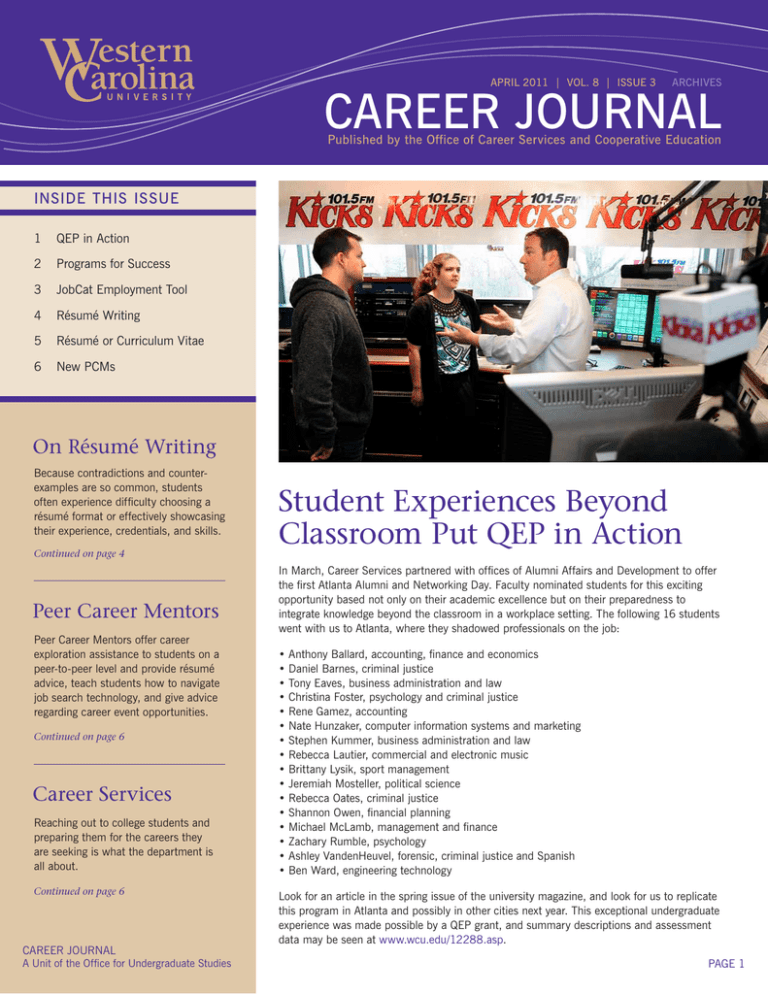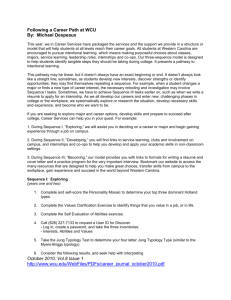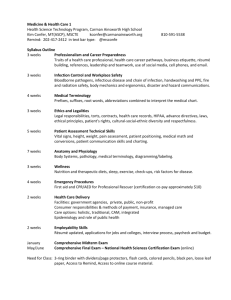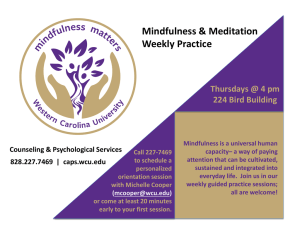CarEEr JOurnal inSidE thiS iSSuE
advertisement

april 2011 | Vol. 8 | Issue 3 archives Career Journal Published by the Office of Career Services and Cooperative Education Inside this Issue 1 QEP in Action 2 Programs for Success 3 JobCat Employment Tool 4 Résumé Writing 5 Résumé or Curriculum Vitae 6 New PCMs On Résumé Writing Because contradictions and counterexamples are so common, students often experience difficulty choosing a résumé format or effectively showcasing their experience, credentials, and skills. Continued on page 4 Peer Career Mentors Peer Career Mentors offer career exploration assistance to students on a peer-to-peer level and provide résumé advice, teach students how to navigate job search technology, and give advice regarding career event opportunities. Continued on page 6 Career Services Reaching out to college students and preparing them for the careers they are seeking is what the department is all about. Continued on page 6 Career Journal A Unit of the Office for Undergraduate Studies Student Experiences Beyond Classroom Put QEP in Action In March, Career Services partnered with offices of Alumni Affairs and Development to offer the first Atlanta Alumni and Networking Day. Faculty nominated students for this exciting opportunity based not only on their academic excellence but on their preparedness to integrate knowledge beyond the classroom in a workplace setting. The following 16 students went with us to Atlanta, where they shadowed professionals on the job: • • • • • • • • • • • • • • • • Anthony Ballard, accounting, finance and economics Daniel Barnes, criminal justice Tony Eaves, business administration and law Christina Foster, psychology and criminal justice Rene Gamez, accounting Nate Hunzaker, computer information systems and marketing Stephen Kummer, business administration and law Rebecca Lautier, commercial and electronic music Brittany Lysik, sport management Jeremiah Mosteller, political science Rebecca Oates, criminal justice Shannon Owen, financial planning Michael McLamb, management and finance Zachary Rumble, psychology Ashley VandenHeuvel, forensic, criminal justice and Spanish Ben Ward, engineering technology Look for an article in the spring issue of the university magazine, and look for us to replicate this program in Atlanta and possibly in other cities next year. This exceptional undergraduate experience was made possible by a QEP grant, and summary descriptions and assessment data may be seen at www.wcu.edu/12288.asp. Page 1 Career Services’ Programs for Success Students and Alumni: Take advantage of the many services we offer! JobCat & Other Job Searching Services Internet-based recruiting systems on our website that include jobs as well as opportunities to post a résumé and sign up for interviews. Career Counseling If you have a career concern that you would like to discuss, call for an appointment with a career counselor. Career Testing If you are having difficulty making a decision about a major or a career, we offer career testing and interpretation. Cooperative Education Co-op is a program that allows you to work in your career or major field and receive directly related experience and credit WHILE you are still in school. Résumé Critiquing Service E-mail your résumé (cover letter, too!) to mdespeaux@wcu.edu or mashe@wcu.edu and make an appointment to discuss it! Student Employment Need some cash? The student employment office can help you find a part-time job. We offer listings for on-campus as well as off-campus employment. View them at careers.wcu.edu. Career Services Website Career Services I nformation 828.227.7133 | careers.wcu.edu Our website offers links, articles, event calendars, job search tools, directories, videos and DISCOVER, a computer-aided guidance program to help you in your career decision. Available at careers.wcu.edu. Interviewing Skills Assistance You can participate in a mock interview and improve your skills through our online Perfect Interview program. Career Days and Recruitment Events Mardy Ashe, Director and Career Counselor mashe@wcu.edu Michael Despeaux, Career Services Coordinator and Career Counselor mdespeaux@wcu.edu Career Services offers about 20 recruitment events every year, including the Career and Graduate School Expo; the Allied Health and Nurses’ Career Day; Spring Job Fest; Summer Job Fair; Engineering, Math, and CS Fair; Construction Management Fair; Education Recruitment Day; and multiple etiquette-development events. Whit A. France-Kelly, Graduate Assistant wafrancekelly@wcu.edu Jessica Ross, Non Work-Study Student Employment Specialist jcross@wcu.edu Peggy Tompkins, Administrative Support Specialist ptompkins@wcu.edu AT TE NT I ON P R I OR I TY ALE R T WANTED � � � The Career Journal is a publication of the Office of Career Services and Cooperative Education at Western Carolina University. Publisher: Michael Despeaux Editor/Photographer: Whit A. France-Kelly Looking for a career mentor? Interested in becoming a mentor? Know someone who should be a mentor? Brought to you by WCU’s Office of Alumni Affairs, Family Association, and Career Services. For more information regarding our 2010-2011 Career Mentor Program, please contact Mike Despeaux or Mardy Ashe in the office of Career Services. WCU is a University of North Carolina campus and an Equal Opportunity Institution. This public document was created for electronic distribution by the Office of Creative Services | April 2011 | 11-327 Page 2 Career Journal Tabitha Ashe is the 2011 WCU Co-op Student of the Year BY mardy ashe This is the 27th year of the WCU Student Co-op of the Year Award, given by Career Services. The award was created in 1984 by a local CPA firm that wanted to recognize excellence in experiential education. Nominated students are judged in four areas: • Work performance • Contributions to co-op employer • Professional development • Personal growth This year, 10 students were nominated by their co-op employers, and seven students made it to the final round. The 2011 winner is senior management major Tabitha Ashe, who co-oped in spring 2010 for the Jackson County Tax Administration Office. Here is Want to get on the career path? JobCat Use what her supervisor, tax assessor Bobby McMahan, said about her experience: “I have supervised people of all ages, race, genders and educational levels over the past 28 years. Tabitha is one of the most organized people I have ever met. She takes great pride in all work tasks she performs. Her ability to be trained for any given task is a bit uncanny. Whether it is a manual task, software issue, programming or hardware implementation, and be they small or large, you never have to tell her or show her twice. She is very thorough, pays great attention to detail and has a very minimal error rate. […] Now and in the future, she will be an asset to any employer.” Given each year by the Office of Career Services, the WCU Student Co-op of the Year award consists of an engraved WCU wall plaque and $500. Congratulations to our 2011 winner, Tabitha Ashe! 1. Log in to JobCat at careers.wcu.edu. 2. Complete a personal profile. 3. Upload a résumé. 4. Submit your online application by the deadline. JobCat is updated with new jobs almost every day, so check for updates regularly! JobCat is the Perfect Employment Tool By Whit A . France-Kelly Career Services offers many opportunities for students looking for jobs through the easy-to-use and free service of JobCat. JobCat also is great for university alumni looking to switch careers or enter into a new profession. JobCat is an Internet-based recruiting system that acts as the primary resource for jobs and internships, on-campus recruiting events, and other career-related events and information. Through JobCat, users are able to: • Upload multiple résumés and cover letters online • Search for and receive alerts on the availability of positions from regional and national companies • Distribute their résumés • Apply for part-time or temporary jobs, internships and/or full-time employment april 2011 These free services are easy to use! To begin using JobCat:* 1.Visit wcu.experience.com or careers.wcu.edu 2.Log in using your personalized 9-2 student identification number and birthday (alumni can self-register to create an account) 3.Complete your personal profile 4.Upload your current résumé; if you do not have an up-to-date résumé, visit Career Services or a peer career mentor for assistance 5.Begin looking for current positions based on major, professional interests and position locations using personalized search criteria** If you need help navigating the software program or are encountering issues concerning your username and password, call Career Services at 828.227.7133. * When searching for positions, it is key to check JobCat frequently, as new positions are updated daily. Also, vary and alternate your search fields to maximize offerings, and be sure to search positions entered by your career center! ** Page 3 On Résumé Writing By michael Despeaux As a career counselor, I see lots of résumés. Increasingly, students listen to us and begin building their first résumés during their first or second semester instead of waiting until graduation or the last minute. Many second- and third-year students will seek our assistance as they prepare to apply for internships or co-ops. Of course, proactive seniors visit Career Services before career fairs and as they enter their job searches. Over the years, my recommendations for writing a résumé have evolved, and I’ve come to realize that there are exceptions to most “rules.” For instance, while it’s still true that most new college graduates should restrict their résumés to one page in length, in some science or health care professions, two or more pages may be acceptable, as long as the information is relevant. While it’s usually conventional to avoid listing high school accomplishments, an increasing number of students begin interning, job shadowing and even seeking college-level credit before completing their secondary education. If these initiatives relate to their chosen field, describing them could show longevity of interest, or at least help them better compete for internships. Many “rules” are grounded in either convention or common sense, but exceptions are bountiful. Because contradictions and counterexamples are so common, students often experience difficulty choosing a résumé format or effectively showcasing their experience, credentials, and skills. Based on the thousands of documents I’ve reviewed since I joined Western Carolina in 2002 (and many more before then, on various search committees), I offer some basic advice. 1. Your résumé is a strategic document. There is no “one size fits all” order or list of headings that you should follow or use. Think about the recipient and the job for which you are applying. Is it teaching? Then use the heading, “Teaching Experience” instead of something less specific. Did you intern in your field? Separate related experience and your internship and list them together under a specific heading, and then list unrelated but meaningful work beneath “Other Experience.” Page 4 Strategy also means thinking about what information is most relevant and how to describe job accomplishments. “Related Coursework” had better relate to the job you’re seeking – that heading should not be seen as an invitation to recreate a transcript on your résumé. If two students majoring in history described their internships at the Mountain Heritage Center, and one sought employment in a museum, and the other chose to enter business or sales, the accomplishments and skills described by each might be very different. Take the time to think about your application, and customize your résumé to focus on that job and showcase the most relevant or transferable skills and experience, the ones that make you a better candidate. 2. Be consistent. Whatever format you choose, consistently present information and formatting. If you tab one date over toward the right, then do the same with them all. Use the same size and type of font for all headings and text. Use the same size margin on the left and right. Left-justify all headings, not just some. Italicize all of your job titles, not just one. 3. Avoid using an automated template. A simple Word document can be elegant and offers much more flexibility so that you can easily add experience throughout college (and beyond) and customize your résumé for different jobs. 4. Avoid overusing bold or other formatting. Too much bold font gives the same impression as an over-highlighted textbook. Just bold your name and section headings. 5. Tab things like dates and locations (city and state) over toward the right, and line them up with the first letter of the word, not the right margin. Using the space bar to position text on a page makes a mess, and right-justifying them looks choppy. 6. Not all résumés need an objective statement, and almost none need sweeping summaries or career objectives. If you write an objective, it should target the reader. It should “connect Career Journal Résumé, or Curriculum Vitae? By michael Despeaux As a career counselor, I help students and alumni with a wide variety of job search documents. By far the most common is the résumé, in all of its variations. Occasionally, sometimes weekly, I get asked about creating a Curriculum Vitae, or “CV.” the dots” between who she wants and who you are. It should specifically state the desired position or company and succinctly describe what you can contribute. 7. Use bullet points to describe your accomplishments beneath each job. Use plain, automated Microsoft Word bullets, not fancy bullets. Do not manufacture them yourself using your keyboard. Start each bulleted phrase with an action verb and make sure the verb tense is correct. 8. Leadership, service and campus involvement are important. Find ways to gain or do these things. Better yet, find ways to integrate your academic work, your experiences and your extracurricular activities. Your faculty adviser or a career counselor can help you identify related student organizations or professional associations, internships and service opportunities that allow you to get professionally involved or put theory into practice. And it looks great on your résumé. 9. Provide complete contact information. Use an email address that incorporates your name and avoids unprofessional phrases. As soon as your résumé is “in play,” be sure that callers do not hear music while their party is reached, and record a simple greeting. 10.Be accurate, honest and correct. Accurately state your degree – I regularly see things like, “bachelor’s degree in whatever.” This is incorrect – you may earn a bachelor of science or a bachelor of arts and so on, but make sure your terminology is exact. Be honest – do not round up your GPA, inflate your titles or claim to have done things you haven’t on a job. Lastly, proofread! Incorrect grammar, misspelled words and typos will get your résumé rejected. For more information on résumés, visit our website at www.wcu.edu/6685.asp to access resources and see a great sample. I enjoy helping students and alumni improve their résumés. Career Services is here to help! april 2011 Although there are a few key differences between a résumé and a CV, they share more things in common than most people realize. Both are strategic documents that should be organized to present a candidate’s credentials, experience, skills and accomplishments in such a way that is most relevant to the job being sought. Both should follow the same broad rules. The main differences between the two documents involve length and professional culture. Although some résumés can be more than one page (for example, in health care or investigative science), CVs are always longer. The CV provides a comprehensive list of things like research interests, publications, presentations and professional development that may cover more breadth than a résumé. CVs are most common in higher education (think of the word “curriculum”) and are usually inclusive of teaching experience and service within a college or university. Positions that typically expect candidates to submit a CV include college faculty, administrators, counselors and student affairs staff; beyond higher education, CVs are common in nonprofit, secondary education administration, perhaps business consulting and other sectors that typically require an advanced or terminal degree. It sounds simplistic to say that a CV is just a longer résumé, but that’s a fair statement. If you’re entering a profession in which you’ll need a CV, don’t omit relevant professional or academic accomplishments in order to shorten the document. Do, however, organize it to emphasize the most relevant things. Education should be at the top of the first page, not hidden on other ones. If you are applying for a teaching position, list teaching experience next, and so on. Think about the order and language of your headings, and be prepared to make changes depending on the position. These practices are just as applicable to résumés. If you need assistance preparing a CV (or a résumé), please contact us. Career Services strives to support job candidates at all levels and in all professions, and we’re happy to help you with your specific needs. Page 5 Career Services Welcomes New PCMs By Whit A . France-Kelly Career Services and Cooperative Education would like to welcome (from left to right) Alisha Lambert, Kasey Jones, Desiree Reagan and Corey Harrington as members of the Peer Career Mentor staff for the upcoming 2011-12 academic year. We are excited to have them on board to serve as liaisons to the Career Services office and staff! Peer Career Mentors offer career exploration assistance to students on a peer-to-peer level and provide résumé advice, teach students how to navigate job search technology, and give advice regarding career event opportunities. Mentors staff a mobile mentoring station, which rotates its location among the university’s colleges and major academic areas while promoting the importance of early and continuous career development. Peer Career Mentors are available Monday through Thursday from 10:30 a.m. until 2:30 p.m. They have assisted nearly 1,000 students over the course of the past eight months with career-related needs. Visit WCU Career Services on Facebook for more information regarding next year’s locations and schedule. Community Résumé Workshop in Sylva BY jennifer wilson Find us on Facebook Facebook is a registered trademark of Facebook, Inc. WCU Career Services has a Facebook page! Become a fan, and we can send you updates on Career Services and Co-op Event happenings. Find us online by searching keywords: “WCU Career Services” on Facebook. Page 6 Being a graduate student in the College Student Personnel program, I am familiar with Career Services and what it is about. I am familiar with the dedication of its employees to helping students with their resumes, interview skills and inventory tests. Reaching out to college students and preparing them for the careers they are seeking is what the department is all about. While working with college students is the department’s main focus, my service learning project in Career Services will extend this assistance to the outside community. I and my Career Services colleagues will be hosting a free résumé and cover letter workshop for the Sylva and Jackson County community. This event will take place Wednesday, April 27, from 4 to 6 p.m. at City Lights Bookstore. We will provide assistance to the public with one-on-one consultations with résumés and cover letters. In addition, representatives also can provide assistance with any other job-related questions. All residents of Jackson County and Sylva are welcome and encouraged to attend. This is just one example of many of how Career Services is helping people to succeed both on and off-campus. Career Journal



